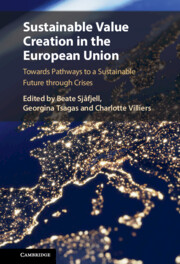 Sustainable Value Creation in the European Union
Sustainable Value Creation in the European Union Book contents
- Sustainable Value Creation in the European Union
- Sustainable Value Creation in the European Union
- Copyright page
- Dedication
- Epigraph
- Contents
- Figures
- Tables
- Contributors
- Foreword
- Preface
- Part I The Objectives of the EU’s Social Market Economy Revisited
- Part II The (UN)Sustainability of the EU Economic System
- Part III Ways Forward in the Promotion of Value Creation
- 8 Financing Sustainable Value Creation
- 9 Integrating Sustainable Value Creation in Corporate Governance
- 10 The Contribution of Social Enterprises to Value Creation in Europe
- 11 The Role of Women in Stimulating New Types of Value Creation
- Part IV Thinking Ahead
- Index
10 - The Contribution of Social Enterprises to Value Creation in Europe
The Case of Dopper BV in the Netherlands
from Part III - Ways Forward in the Promotion of Value Creation
Published online by Cambridge University Press: 01 December 2022
- Sustainable Value Creation in the European Union
- Sustainable Value Creation in the European Union
- Copyright page
- Dedication
- Epigraph
- Contents
- Figures
- Tables
- Contributors
- Foreword
- Preface
- Part I The Objectives of the EU’s Social Market Economy Revisited
- Part II The (UN)Sustainability of the EU Economic System
- Part III Ways Forward in the Promotion of Value Creation
- 8 Financing Sustainable Value Creation
- 9 Integrating Sustainable Value Creation in Corporate Governance
- 10 The Contribution of Social Enterprises to Value Creation in Europe
- 11 The Role of Women in Stimulating New Types of Value Creation
- Part IV Thinking Ahead
- Index
Summary
Governments and the markets in Europe have traditionally failed to adequately address environmental and ecological issues such as the access to clean and drinkable water and pollution of the Atlantic Ocean and the Mediterranean Sea. However, social enterprises across Europe have demonstrated that social entrepreneurship can play a role in providing creative and efficient solutions to social, environmental and ecological problems while employing inclusive and participatory governance models, which involve stakeholders and the affected society. Research in this chapter focuses on social enterprises in the Netherlands, which country also suffers from ecological porblems. Through a case study analysis of the Dutch social enterprise Dopper, which organisation aims to contribute to solving the problem of plastic waste, creating awareness about this problem as well as about access to drinking water, the contribution of value creation is analysed. Against the backdrop of a discussion concerning the emergence of social enterprises in the Netherlands despite the existence of a supportive legal framework, this chapter also illustrates examples of legal and participatory governance structures employed in Dutch social enterprises’ organisational structure and function. These can serve as illustrations of sustainable business structures in the Netherlands and in Europe.
Keywords
- Type
- Chapter
- Information
- Sustainable Value Creation in the European UnionTowards Pathways to a Sustainable Future through Crises, pp. 237 - 275Publisher: Cambridge University PressPrint publication year: 2022
